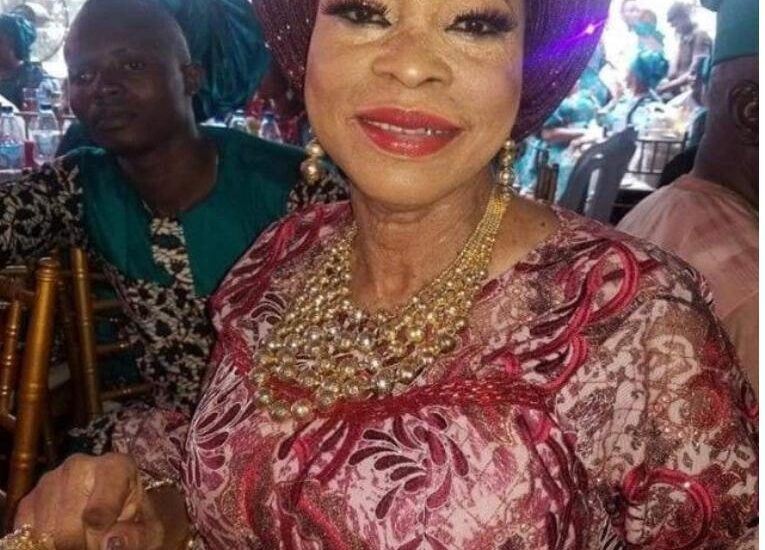Alhaja Monsurat Ashabi Oluwatoyin Oyemade Rufai Abraham, also known as Toyin Igbira, was one of the most prominent figures in Nigeria’s drug trafficking history.
She was known by various names like the drug queen, the lioness, and the living ghost. However, her most popular nickname was Bùjẹ̀búdánù. Bùjẹ̀ means to spend lavishly, wastefully, or without restraint. Búdánù means to squander or throw away. So, Bùjẹ̀búdánù literally means the one who spends and squanders without limit.
In Toyin Igbira’s case, it referred to her habit of spraying huge sums of cash at parties and funding musicians, films, and lavish events, giving the impression of a bottomless pocket. She operated a drug network that spanned Lagos, London, Zurich, Chicago, and New York, and her activities included heroin trafficking, often concealed behind her textile business and other ventures.
Toyin Igbira’s journey began in Mushin, Lagos, where she was born in 1963. She attended St. Paul’s Primary School in Idi Oro and later enrolled at Reagan Memorial Girls’ High School. However, her education was cut short when she dropped out in JSS2. Having no degree whatsoever, Toyin went into business with her mother. She started selling smuggled cigarettes from Cotonou, before she moved to fabrics.
She got her big break in 1994 when she was 31 years old. She met a London-based Nigerian named Fatai, who introduced her to heroin. He disguised it at first as horse medicine, a kind of rare tablet that sold fast in the UK. Toyin joined him and started to make stupendous money. When Fatai died mysteriously in 1996, Toyin seized control of his network, and from then on, her rise was unstoppable.
Her Drug Empire
Toyin recruited drivers, hustlers, and even disabled athletes in her quest for wealth. The story goes that many of her couriers who swallowed the drugs never lived to tell the story. Outwardly, she ran a successful textile business, but in reality, she was a drug baroness. One of the notable cases tied to her was the 1996 Atlanta Paralympic Games.
Two of the Nigerian athletes were caught smuggling drugs. Their wheelchairs were modified, and heroin was packed into the foam. This act stained Nigeria’s image and showed Toyin’s willingness to exploit the vulnerable. She moved drugs in everything, including wheelchairs, containers, fuel tanks, etc.
After years of failed stings, Toyin was finally arrested in December 1997 by National Drug Law Enforcement Agency (NDLEA) operatives. She was arrested and paraded, then locked in Kirikiri Maximum Prison on multiple trafficking charges. But in August 1999, something shocking happened. Justice Abubakar Abdulkadir Jega released her on bail and personally drove her away in his own car to shield her from re-arrest.
The NDLEA was furious about this, but powerless. Toyin, on the other hand, immersed herself back into society and lived like royalty. She went to parties and organised some where Fuji musicians praised her in songs, calling her “Onile Eru l’Abidjan” — the Woman with the Warehouse in Abidjan.
Fresh Charges
NDLEA was so pained by her release that on 24th of August 1999, just days after Justice Jega freed her, they filed two fresh charges against her at the Federal High Court.
The first suit, FHC/L118c/99, alleged that on or about 5 April 1995, Toyin Igbira conspired with George Olanrewaju Owumi to export 1.112 kg of heroin to Zurich, Switzerland — an offence under Section 10c (b) of the NDLEA Decree 15 of 1992.
The second suit accused her of conspiring with Miss Helen Osemene Izien to export 1.35 kg of heroin to New York, USA, also punishable under the same decree.
Filing these fresh charges, NDLEA was confident they had bulletproof cases and believed Toyin would never escape this time. When the case came up on Monday, 6th September 1998, Toyin suddenly pleaded that she was ill. The move stalled proceedings, and the case was adjourned to 14th September, giving her more time to frustrate the process.
Between 1999 and 2002, Toyin Igbira vanished. She resurfaced sometime in 2002, and on November 15, 2002, NDLEA struck again. Toyin was arrested at Murtala Muhammed International Airport with 72 wraps of heroin hidden in her luggage, ready for export to the United States. This was the moment Nigerians saw her face clearly in newspapers. At a press conference, NDLEA declared they had pursued her since 1997, and they were elated that they had finally caught her.
Still, the system bent, and Toyin managed to find her way out again. The courts were forced to adjourn and adjourn until Toyin fled the country and disappeared.
Her Death
Nine months later, on July 20, 2019, she died quietly in Surulere at the age of 56 from ovarian cancer. Toyin even planned her own funeral before passing and allegedly bought a ₦20,000,000 vault for herself. She left behind a husband, three children and properties in Mushin, Surulere, Ikeja, Abuja, and the US.Alhaja Monsurat Ashabi Oluwatoyin Oyemade Rufai Abraham, also known as Toyin Igbira, was one of the most prominent figures in Nigeria’s drug trafficking history.
She was known by various names like the drug queen, the lioness, and the living ghost. However, her most popular nickname was Bùjẹ̀búdánù. Bùjẹ̀ means to spend lavishly, wastefully, or without restraint. Búdánù means to squander or throw away. So, Bùjẹ̀búdánù literally means the one who spends and squanders without limit.
In Toyin Igbira’s case, it referred to her habit of spraying huge sums of cash at parties and funding musicians, films, and lavish events, giving the impression of a bottomless pocket. She operated a drug network that spanned Lagos, London, Zurich, Chicago, and New York, and her activities included heroin trafficking, often concealed behind her textile business and other ventures.
Toyin Igbira’s journey began in Mushin, Lagos, where she was born in 1963. She attended St. Paul’s Primary School in Idi Oro and later enrolled at Reagan Memorial Girls’ High School. However, her education was cut short when she dropped out in JSS2. Having no degree whatsoever, Toyin went into business with her mother. She started selling smuggled cigarettes from Cotonou, before she moved to fabrics.
She got her big break in 1994 when she was 31 years old. She met a London-based Nigerian named Fatai, who introduced her to heroin. He disguised it at first as horse medicine, a kind of rare tablet that sold fast in the UK. Toyin joined him and started to make stupendous money. When Fatai died mysteriously in 1996, Toyin seized control of his network, and from then on, her rise was unstoppable.
Her Drug Empire
Toyin recruited drivers, hustlers, and even disabled athletes in her quest for wealth. The story goes that many of her couriers who swallowed the drugs never lived to tell the story. Outwardly, she ran a successful textile business, but in reality, she was a drug baroness. One of the notable cases tied to her was the 1996 Atlanta Paralympic Games.
Two of the Nigerian athletes were caught smuggling drugs. Their wheelchairs were modified, and heroin was packed into the foam. This act stained Nigeria’s image and showed Toyin’s willingness to exploit the vulnerable. She moved drugs in everything, including wheelchairs, containers, fuel tanks, etc.
After years of failed stings, Toyin was finally arrested in December 1997 by National Drug Law Enforcement Agency (NDLEA) operatives. She was arrested and paraded, then locked in Kirikiri Maximum Prison on multiple trafficking charges. But in August 1999, something shocking happened. Justice Abubakar Abdulkadir Jega released her on bail and personally drove her away in his own car to shield her from re-arrest.
The NDLEA was furious about this, but powerless. Toyin, on the other hand, immersed herself back into society and lived like royalty. She went to parties and organised some where Fuji musicians praised her in songs, calling her “Onile Eru l’Abidjan” — the Woman with the Warehouse in Abidjan.
Fresh Charges
NDLEA was so pained by her release that on 24th of August 1999, just days after Justice Jega freed her, they filed two fresh charges against her at the Federal High Court.
The first suit, FHC/L118c/99, alleged that on or about 5 April 1995, Toyin Igbira conspired with George Olanrewaju Owumi to export 1.112 kg of heroin to Zurich, Switzerland — an offence under Section 10c (b) of the NDLEA Decree 15 of 1992.
The second suit accused her of conspiring with Miss Helen Osemene Izien to export 1.35 kg of heroin to New York, USA, also punishable under the same decree.
Filing these fresh charges, NDLEA was confident they had bulletproof cases and believed Toyin would never escape this time. When the case came up on Monday, 6th September 1998, Toyin suddenly pleaded that she was ill. The move stalled proceedings, and the case was adjourned to 14th September, giving her more time to frustrate the process.
Between 1999 and 2002, Toyin Igbira vanished. She resurfaced sometime in 2002, and on November 15, 2002, NDLEA struck again. Toyin was arrested at Murtala Muhammed International Airport with 72 wraps of heroin hidden in her luggage, ready for export to the United States. This was the moment Nigerians saw her face clearly in newspapers. At a press conference, NDLEA declared they had pursued her since 1997, and they were elated that they had finally caught her.
Still, the system bent, and Toyin managed to find her way out again. The courts were forced to adjourn and adjourn until Toyin fled the country and disappeared.
Her Death
Nine months later, on July 20, 2019, she died quietly in Surulere at the age of 56 from ovarian cancer. Toyin even planned her own funeral before passing and allegedly bought a ₦20,000,000 vault for herself. She left behind a husband, three children and properties in Mushin, Surulere, Ikeja, Abuja, and the US.Alhaja Monsurat Ashabi Oluwatoyin Oyemade Rufai Abraham, also known as Toyin Igbira, was one of the most prominent figures in Nigeria’s drug trafficking history.
She was known by various names like the drug queen, the lioness, and the living ghost. However, her most popular nickname was Bùjẹ̀búdánù. Bùjẹ̀ means to spend lavishly, wastefully, or without restraint. Búdánù means to squander or throw away. So, Bùjẹ̀búdánù literally means the one who spends and squanders without limit.
In Toyin Igbira’s case, it referred to her habit of spraying huge sums of cash at parties and funding musicians, films, and lavish events, giving the impression of a bottomless pocket. She operated a drug network that spanned Lagos, London, Zurich, Chicago, and New York, and her activities included heroin trafficking, often concealed behind her textile business and other ventures.
Toyin Igbira’s journey began in Mushin, Lagos, where she was born in 1963. She attended St. Paul’s Primary School in Idi Oro and later enrolled at Reagan Memorial Girls’ High School. However, her education was cut short when she dropped out in JSS2. Having no degree whatsoever, Toyin went into business with her mother. She started selling smuggled cigarettes from Cotonou, before she moved to fabrics.
She got her big break in 1994 when she was 31 years old. She met a London-based Nigerian named Fatai, who introduced her to heroin. He disguised it at first as horse medicine, a kind of rare tablet that sold fast in the UK. Toyin joined him and started to make stupendous money. When Fatai died mysteriously in 1996, Toyin seized control of his network, and from then on, her rise was unstoppable.
Her Drug Empire
Toyin recruited drivers, hustlers, and even disabled athletes in her quest for wealth. The story goes that many of her couriers who swallowed the drugs never lived to tell the story. Outwardly, she ran a successful textile business, but in reality, she was a drug baroness. One of the notable cases tied to her was the 1996 Atlanta Paralympic Games.
Two of the Nigerian athletes were caught smuggling drugs. Their wheelchairs were modified, and heroin was packed into the foam. This act stained Nigeria’s image and showed Toyin’s willingness to exploit the vulnerable. She moved drugs in everything, including wheelchairs, containers, fuel tanks, etc.
After years of failed stings, Toyin was finally arrested in December 1997 by National Drug Law Enforcement Agency (NDLEA) operatives. She was arrested and paraded, then locked in Kirikiri Maximum Prison on multiple trafficking charges. But in August 1999, something shocking happened. Justice Abubakar Abdulkadir Jega released her on bail and personally drove her away in his own car to shield her from re-arrest.
The NDLEA was furious about this, but powerless. Toyin, on the other hand, immersed herself back into society and lived like royalty. She went to parties and organised some where Fuji musicians praised her in songs, calling her “Onile Eru l’Abidjan” — the Woman with the Warehouse in Abidjan.
Fresh Charges
NDLEA was so pained by her release that on 24th of August 1999, just days after Justice Jega freed her, they filed two fresh charges against her at the Federal High Court.
The first suit, FHC/L118c/99, alleged that on or about 5 April 1995, Toyin Igbira conspired with George Olanrewaju Owumi to export 1.112 kg of heroin to Zurich, Switzerland — an offence under Section 10c (b) of the NDLEA Decree 15 of 1992.
The second suit accused her of conspiring with Miss Helen Osemene Izien to export 1.35 kg of heroin to New York, USA, also punishable under the same decree.
Filing these fresh charges, NDLEA was confident they had bulletproof cases and believed Toyin would never escape this time. When the case came up on Monday, 6th September 1998, Toyin suddenly pleaded that she was ill. The move stalled proceedings, and the case was adjourned to 14th September, giving her more time to frustrate the process.
Between 1999 and 2002, Toyin Igbira vanished. She resurfaced sometime in 2002, and on November 15, 2002, NDLEA struck again. Toyin was arrested at Murtala Muhammed International Airport with 72 wraps of heroin hidden in her luggage, ready for export to the United States. This was the moment Nigerians saw her face clearly in newspapers. At a press conference, NDLEA declared they had pursued her since 1997, and they were elated that they had finally caught her.
Still, the system bent, and Toyin managed to find her way out again. The courts were forced to adjourn and adjourn until Toyin fled the country and disappeared.
Her Death
Nine months later, on July 20, 2019, she died quietly in Surulere at the age of 56 from ovarian cancer. Toyin even planned her own funeral before passing and allegedly bought a ₦20,000,000 vault for herself. She left behind a husband, three children and properties in Mushin, Surulere, Ikeja, Abuja, and the US.Alhaja Monsurat Ashabi Oluwatoyin Oyemade Rufai Abraham, also known as Toyin Igbira, was one of the most prominent figures in Nigeria’s drug trafficking history.
She was known by various names like the drug queen, the lioness, and the living ghost. However, her most popular nickname was Bùjẹ̀búdánù. Bùjẹ̀ means to spend lavishly, wastefully, or without restraint. Búdánù means to squander or throw away. So, Bùjẹ̀búdánù literally means the one who spends and squanders without limit.
In Toyin Igbira’s case, it referred to her habit of spraying huge sums of cash at parties and funding musicians, films, and lavish events, giving the impression of a bottomless pocket. She operated a drug network that spanned Lagos, London, Zurich, Chicago, and New York, and her activities included heroin trafficking, often concealed behind her textile business and other ventures.
Toyin Igbira’s journey began in Mushin, Lagos, where she was born in 1963. She attended St. Paul’s Primary School in Idi Oro and later enrolled at Reagan Memorial Girls’ High School. However, her education was cut short when she dropped out in JSS2. Having no degree whatsoever, Toyin went into business with her mother. She started selling smuggled cigarettes from Cotonou, before she moved to fabrics.
She got her big break in 1994 when she was 31 years old. She met a London-based Nigerian named Fatai, who introduced her to heroin. He disguised it at first as horse medicine, a kind of rare tablet that sold fast in the UK. Toyin joined him and started to make stupendous money. When Fatai died mysteriously in 1996, Toyin seized control of his network, and from then on, her rise was unstoppable.
Her Drug Empire
Toyin recruited drivers, hustlers, and even disabled athletes in her quest for wealth. The story goes that many of her couriers who swallowed the drugs never lived to tell the story. Outwardly, she ran a successful textile business, but in reality, she was a drug baroness. One of the notable cases tied to her was the 1996 Atlanta Paralympic Games.
Two of the Nigerian athletes were caught smuggling drugs. Their wheelchairs were modified, and heroin was packed into the foam. This act stained Nigeria’s image and showed Toyin’s willingness to exploit the vulnerable. She moved drugs in everything, including wheelchairs, containers, fuel tanks, etc.
After years of failed stings, Toyin was finally arrested in December 1997 by National Drug Law Enforcement Agency (NDLEA) operatives. She was arrested and paraded, then locked in Kirikiri Maximum Prison on multiple trafficking charges. But in August 1999, something shocking happened. Justice Abubakar Abdulkadir Jega released her on bail and personally drove her away in his own car to shield her from re-arrest.
The NDLEA was furious about this, but powerless. Toyin, on the other hand, immersed herself back into society and lived like royalty. She went to parties and organised some where Fuji musicians praised her in songs, calling her “Onile Eru l’Abidjan” — the Woman with the Warehouse in Abidjan.
Fresh Charges
NDLEA was so pained by her release that on 24th of August 1999, just days after Justice Jega freed her, they filed two fresh charges against her at the Federal High Court.
The first suit, FHC/L118c/99, alleged that on or about 5 April 1995, Toyin Igbira conspired with George Olanrewaju Owumi to export 1.112 kg of heroin to Zurich, Switzerland — an offence under Section 10c (b) of the NDLEA Decree 15 of 1992.
The second suit accused her of conspiring with Miss Helen Osemene Izien to export 1.35 kg of heroin to New York, USA, also punishable under the same decree.
Filing these fresh charges, NDLEA was confident they had bulletproof cases and believed Toyin would never escape this time. When the case came up on Monday, 6th September 1998, Toyin suddenly pleaded that she was ill. The move stalled proceedings, and the case was adjourned to 14th September, giving her more time to frustrate the process.
Between 1999 and 2002, Toyin Igbira vanished. She resurfaced sometime in 2002, and on November 15, 2002, NDLEA struck again. Toyin was arrested at Murtala Muhammed International Airport with 72 wraps of heroin hidden in her luggage, ready for export to the United States. This was the moment Nigerians saw her face clearly in newspapers. At a press conference, NDLEA declared they had pursued her since 1997, and they were elated that they had finally caught her.
Still, the system bent, and Toyin managed to find her way out again. The courts were forced to adjourn and adjourn until Toyin fled the country and disappeared.
Her Death
Nine months later, on July 20, 2019, she died quietly in Surulere at the age of 56 from ovarian cancer. Toyin even planned her own funeral before passing and allegedly bought a ₦20,000,000 vault for herself. She left behind a husband, three children and properties in Mushin, Surulere, Ikeja, Abuja, and the US.Alhaja Monsurat Ashabi Oluwatoyin Oyemade Rufai Abraham, also known as Toyin Igbira, was one of the most prominent figures in Nigeria’s drug trafficking history.
She was known by various names like the drug queen, the lioness, and the living ghost. However, her most popular nickname was Bùjẹ̀búdánù. Bùjẹ̀ means to spend lavishly, wastefully, or without restraint. Búdánù means to squander or throw away. So, Bùjẹ̀búdánù literally means the one who spends and squanders without limit.
In Toyin Igbira’s case, it referred to her habit of spraying huge sums of cash at parties and funding musicians, films, and lavish events, giving the impression of a bottomless pocket. She operated a drug network that spanned Lagos, London, Zurich, Chicago, and New York, and her activities included heroin trafficking, often concealed behind her textile business and other ventures.
Toyin Igbira’s journey began in Mushin, Lagos, where she was born in 1963. She attended St. Paul’s Primary School in Idi Oro and later enrolled at Reagan Memorial Girls’ High School. However, her education was cut short when she dropped out in JSS2. Having no degree whatsoever, Toyin went into business with her mother. She started selling smuggled cigarettes from Cotonou, before she moved to fabrics.
She got her big break in 1994 when she was 31 years old. She met a London-based Nigerian named Fatai, who introduced her to heroin. He disguised it at first as horse medicine, a kind of rare tablet that sold fast in the UK. Toyin joined him and started to make stupendous money. When Fatai died mysteriously in 1996, Toyin seized control of his network, and from then on, her rise was unstoppable.
Her Drug Empire
Toyin recruited drivers, hustlers, and even disabled athletes in her quest for wealth. The story goes that many of her couriers who swallowed the drugs never lived to tell the story. Outwardly, she ran a successful textile business, but in reality, she was a drug baroness. One of the notable cases tied to her was the 1996 Atlanta Paralympic Games.
Two of the Nigerian athletes were caught smuggling drugs. Their wheelchairs were modified, and heroin was packed into the foam. This act stained Nigeria’s image and showed Toyin’s willingness to exploit the vulnerable. She moved drugs in everything, including wheelchairs, containers, fuel tanks, etc.
After years of failed stings, Toyin was finally arrested in December 1997 by National Drug Law Enforcement Agency (NDLEA) operatives. She was arrested and paraded, then locked in Kirikiri Maximum Prison on multiple trafficking charges. But in August 1999, something shocking happened. Justice Abubakar Abdulkadir Jega released her on bail and personally drove her away in his own car to shield her from re-arrest.
The NDLEA was furious about this, but powerless. Toyin, on the other hand, immersed herself back into society and lived like royalty. She went to parties and organised some where Fuji musicians praised her in songs, calling her “Onile Eru l’Abidjan” — the Woman with the Warehouse in Abidjan.
Fresh Charges
NDLEA was so pained by her release that on 24th of August 1999, just days after Justice Jega freed her, they filed two fresh charges against her at the Federal High Court.
The first suit, FHC/L118c/99, alleged that on or about 5 April 1995, Toyin Igbira conspired with George Olanrewaju Owumi to export 1.112 kg of heroin to Zurich, Switzerland — an offence under Section 10c (b) of the NDLEA Decree 15 of 1992.
The second suit accused her of conspiring with Miss Helen Osemene Izien to export 1.35 kg of heroin to New York, USA, also punishable under the same decree.
Filing these fresh charges, NDLEA was confident they had bulletproof cases and believed Toyin would never escape this time. When the case came up on Monday, 6th September 1998, Toyin suddenly pleaded that she was ill. The move stalled proceedings, and the case was adjourned to 14th September, giving her more time to frustrate the process.
Between 1999 and 2002, Toyin Igbira vanished. She resurfaced sometime in 2002, and on November 15, 2002, NDLEA struck again. Toyin was arrested at Murtala Muhammed International Airport with 72 wraps of heroin hidden in her luggage, ready for export to the United States. This was the moment Nigerians saw her face clearly in newspapers. At a press conference, NDLEA declared they had pursued her since 1997, and they were elated that they had finally caught her.
Still, the system bent, and Toyin managed to find her way out again. The courts were forced to adjourn and adjourn until Toyin fled the country and disappeared.
Her Death
Nine months later, on July 20, 2019, she died quietly in Surulere at the age of 56 from ovarian cancer. Toyin even planned her own funeral before passing and allegedly bought a ₦20,000,000 vault for herself. She left behind a husband, three children and properties in Mushin, Surulere, Ikeja, Abuja, and the US.






